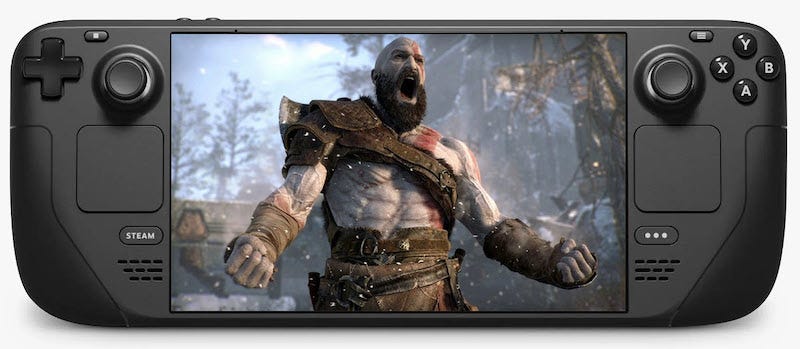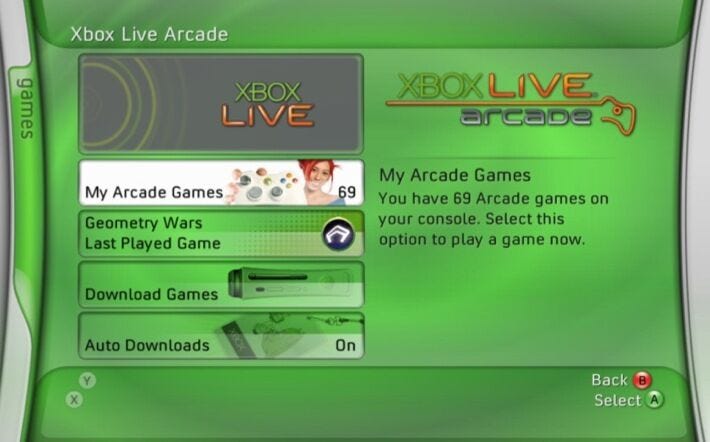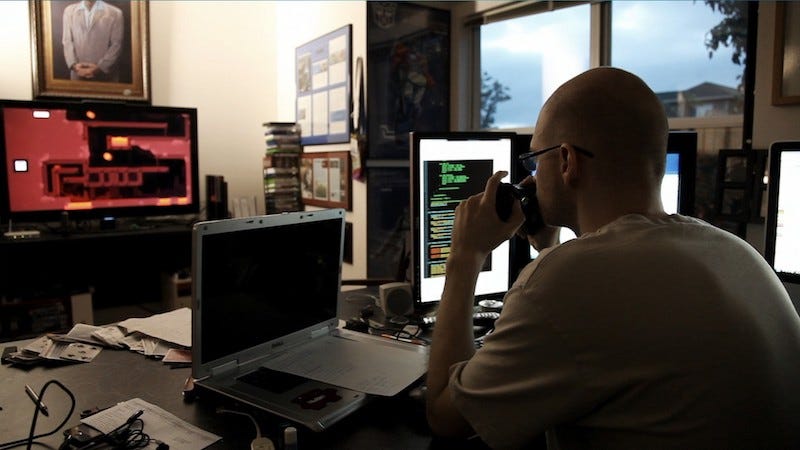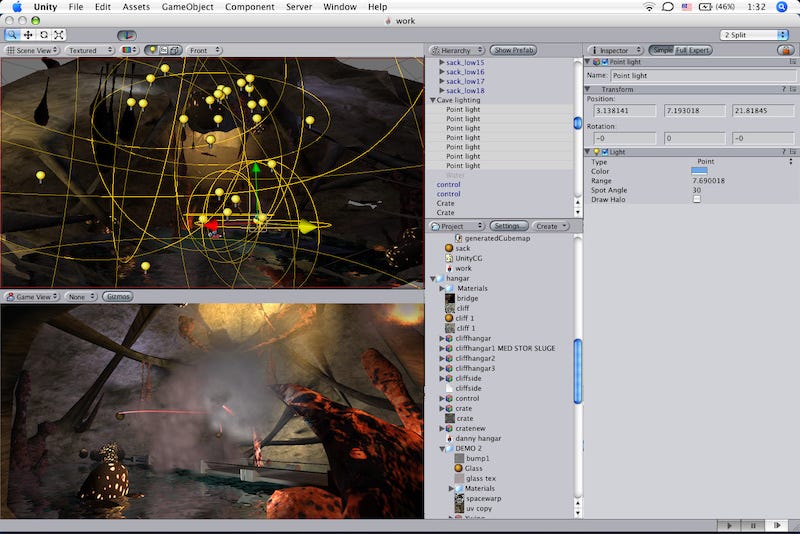15 years later, did indie game discovery happen like we thought?
What's changed in game distribution, tools and platforms since?
[The GameDiscoverCo game discovery newsletter is written by ‘how people find your game’ expert & GameDiscoverCo founder Simon Carless, and is a regular look at how people discover and buy video games in the 2020s.]
Greetings, game discovery and platform crew. And this time out, our lead story is going to be a rare look back. For those who remember ‘the distant past’, I was the co-founder of the Independent Games Summit as part of Game Developers Conference all the way back in 2007, as part of my work around GDC from 2005 to 2020.
For those wondering, the associated Independent Games Festival at GDC for 2007 had finalists such as Aquaria, Everyday Shooter and Castle Crashers - it really was the dawn of the age of viable independent/digital-first games. (The first third-party games arrived on Steam in 2005, to give you some context, and Xbox Live Arcade was just getting going.)
Anyhow, we thought we’d look back at a wide-ranging panel from IGS 2007, nearly 15 years ago (!) and see - what was prescient and what wasn’t about future prognostications from back in the day?
[Thanks to new members of our GameDiscoverCo Plus paid subscription - only $12 a month if you sign up for a year, and includes an info-filled Discord, a data-exportable Steam Hype back-end for ranking/comparing unreleased games, our new eBook, & lots more - join them!]
2007 vs 2021: what did indies get right about game discovery & the future?
We’ve decided to focus on the above panel, 'Building The Future of Indie Games', featuring Derek Yu (TIGSource, Aquaria, Spelunky), Greg Costikyan (game designer, known for early indie store aggregator Manifesto Games), Mark Morris of Introversion (2006 IGF winner Darwinia, Prison Architect) and Eric Zimmerman (academic, Gamelab co-founder and Diner Dash co-designer.)
And the moderator was, uh, myself, as Chairperson of the Independent Games Festival at the time. As I explained in the intro: “We’ll look at the next two, five or even ten years for the independent games movement, how will the opportunities to make a living change, where is innovation going to come from - and how and why is it a particularly good or bad time to be in an indie game creator?”
The rise of the digital platforms & platform cut?
2007 was still a very retail-centric era. Xbox Live Arcade had only just launched for Xbox 360 in 2005, and Steam was still incredibly early for third-parties. Many devs were used to making either ‘work for hire’ games for publishers, or getting very poor quality royalties on games made for others. The idea that you didn’t need a publisher and could work directly with digital platforms was brand new!
As moderator, I was trying to puzzle through the era where Steam wasn’t yet dominant, there were a lot of PC casual game-style ‘aggregators’ like Big Fish & Reflexive, and indie games didn’t have a clear home.
As I mused: “It seems to me that it's somewhat about creating funnels. And if you're talking about online, all of these larger aggregators are creating large funnels and then you pay to appear on their funnel. My slight concern - is it possible to build your own funnel that is big enough, or do you just have to distribute yourself over other multiple funnels?”
Greg Costikyan, who was repping the extremely egalitarian Manifesto Games store portal, feared a royalty squeeze over time: “The existence of downloadable content on consoles is a great thing and it offers a new venue for you know distribution for people. On the other hand we're still dealing with the same kind of command and control environment with a single gatekeeper and at the moment… Xbox Live Arcade is offering very favorable terms in terms of share of the consumer dollar to developers.”
“Since they are the sole point of distribution, they have a chokehold on that. And as the dollar value grows the temptation for them to demand a higher and higher proportion of revenues will increase - as we've seen with the increase in the revenue share that Yahoo! demands for casual games. So ultimately, closed platforms are not the the path to the future.”
So the good news from our 2021 perspective - the percentage taken by PC/console platforms didn’t go up. And you can reach hundreds of millions of possible consumers via these platforms. But the bad news - almost all of your game’s revenues come with a 30% ‘tax’ from one platform ‘funnel’ or another, and it’s never shifted down over time. And we hear this fact is still… controversial somehow?
But from a 2007 perspective, as Introversion’s Mark Morris says, the shift from ‘work for hire’ for publishers to indies working directly with platforms was revolutionary: “In a lot of cases, I see developers who have spent a lot of time in the industry… they start accepting the rough end of the deal [with contract work, etc]… What does a publisher do now really? Why do I need them? If I can fund the games myself, why do I need anything that they can offer - I can do [it] all myself? And that's the message… I can do it, [and] so can every other developer in the world.”
How marketing and discovery might evolve
The funny thing about 2007 is that we couldn’t really envision the rise of YouTube, Twitch, and the massive social networks like TikTok which can dominate game discovery nowadays. It was very much about getting reviewed on big ‘game review’ websites and covered by a smaller set of fan media.
As I noted in the panel: “Here is a bit of a barrier… if you look at the big [review] sites you have to be in a [retail] box… I think Gish got a GameSpot review as I recall [NOTE: it did, by Portal writer Erik Wolpaw!], but there's very few independent games that get reviewed on GameSpot and IGN. And that's kind of a mechanical thing, I think, and I don't quite understand how that changes.”
But even then, the idea of genuine, direct community & outreach from the heart was starting to take shape. As Derek Yu (who had just completed Aquaria, and was yet to make Spelunky) said: “I think an advantage that independent developers have when marketing is that you can be personal. A mainstream game doesn't really have that kind of opportunity… by buying a good product [players] are also supporting a real person who's behind that product.” This still 100% holds true today.
And Mark Morris preached the virtues of the honest hustle: “There are so many sites on the Internet that will review your game and drive traffic straight towards you if you court the press. And I don't mean court the press by sending them gifts and things… go down and see them… they've got the same passion about the games that that you've got. They'll write about a lot and say interesting things.”
Possibly based on his behavior when Darwinia won the 2006 IGF Grand Prize, Mark also jokes: “Swear a lot, that gets you coverage… you need to do something with all the work that you're doing to let everyone in the world know about your games, and also you've got to get ‘out there’ all the time.” This idea of being aggressive in pitching your game, as the actual developer, was actually… fairly novel at the time? (And some of us still have trouble with it!)
Should you quit your job to make indie games?
In 2007, whether you should make indie games full-time was absolutely an operative question. Remember, we’re 5 years before Indie Game: The Movie, which both gave people a lot of feelings(TM) and kickstarted the ‘you can make it as an indie’ trend even more aggressively.
But this was the start of wrestling with that question. And Eric Zimmerman, co-running the innovative Gamelab at the time, said: “The question of making a living doing this is important. There's a certain kind of game that you can make as a sort of lone wolf developer or working with one or two other people in your spare time, there's also a kind of medium-sized game where you that requires a real company.”
He was trying to run a New York-based indie with proper offices and paid staff, and noted, fairly: “I think that it's great there's a there's a whole spectrum of indie game developers that we need to have from people uploading games to NewGrounds for free, but also up through companies that can sustain themselves as commercial entities where you have this dedicated teams that are there every day getting salaries. And it's really hard [at times to do that].”
To a great extent, that struggle is still real. And Mark Morris, still playing off his punk provocateur persona, said: “When you decide that you want to be an independent games company, you have to accept all of the ride that's going to go with it, the times when you're not going to be able to afford your mortgage payments and all the rest of it. And that's the same for any entrepreneur - you don't get rich quick, what you do is you suffer for a long long time. And if you're not willing, if you're not prepared to suffer, then no, keep working for EA or something.”
(BTW, it’s interesting in retrospect that Darwinia was not Introversion’s big payday. It was just too early in the indie cycle, perhaps a bit abstract, and the Xbox version didn’t sell that well. But 2012’s Prison Architect, which has grossed $20 million+ dollars, certainly was for them.)
Finally, the resolute indie rebel Greg Costikyan had an interesting perspective: “So when I say I don't quit your day job, I mean this is not Gold Rush territory, guys. The number of people who are going to get rich doing independent games in the next five years anyway is... I will be very surprised if you can count it on the fingers of one hand, alright?”
Well - in the end, quite a few indies got ‘rich’, especially with less competition in that pioneering 2008 to 2013 era. And even now, there’s a lot of indies doing well, as we document - if not always ‘filthy rich’, haha. But the number of competing games has scaled up massively, even at the same time that the audience has scaled up.
The democratization of game tools?
Before we wrap things up, just thought it was interesting to check in on the subject of game tools. Unity, as a game engine, was two years old in 2007, but it wasn’t yet being used for that many commercial titles. (And Unreal was available - but still in the ‘extremely expensive’ category, as I recall.)
But there were certainly hints that tools would make creating games way more straightforward, beyond more basic tools like Klik & Play, which Derek Yu had used for some of his earlier titles. As he says: “I see ideas as being the most important thing. And I think tools are enablers, they allow more people to express themselves. And that's a good thing, because the more people that can make games, the more potentially good games.”
Mark Morris added: “I think it'll just change the nature of the games that are coming out the indie sector… there'll be an a kind of a general increase in quality, but you won't notice [since] there'll be the increase in quality across the… board, because everyone's using the tools, you know?”
And looking back from a 2021 perspective? That’s totally what happened. The technical quality bar on your average game is just higher because of current tools and engines. And at one point, there were a raft of specialist tool companies catering to higher-budget games. Nowadays? It’s mainly a level playing field, albeit a highly (problematically?) consolidated one.
Conclusion: the Cambrian explosion is real!
There was a separate IGS 2007 panel on ‘innovation’ that we may excerpt at some point in the future. But to end, I wanted to quote this passage from Gamelab’s Eric Zimmerman during the panel, which touches on the idea that the flowering of the indie scene would benefit us all:
“The fact is that early electronic music experiments from the ‘60s and ‘70s are probably unlistenable to today's audiences. But it's those experiments that then led to… German industrial music which led to British electronic music, and at some point maybe the Chemical Brothers. And electronica moved out of just techno clubs and into mainstream music, and now it's completely infused it…
The most important thing is that we have a kind of cultural ecosystem with games that's rich and robust enough to support all different sort of kinds of life. [We need] big huge hulking corporate monsters, as well as… strange little hybrid bizarre creatures that are only going to live for a little while. No-one wants to look at them anyway, but they may and die and fertilize something else with their corpse.”
2007 really was somewhere near the start of the Cambrian explosion of independent games. And I think it’s genuinely intriguing to go back and work out what changed - and what stayed the same - from those days. But what’s for sure? We’re living with this fascinating explosion of games every day in 2021. And maybe, just maybe your game will fertilize another with its corpse one day?
[Thanks to GameDiscoverCo data/ops lead Al for helping me with the transcription for this article, btw!]
The game discovery news round-up..

Well, we’re almost done with the free newsletters for the week - though Plus subscribers, you still get an awesome one on Friday. So let’s shake off the lethargy and power through to the final links of the week, discovery-wise:
The new Steam ‘On Deck’ Twitter account is looking for games to show off in video form. So if your game works great on the Steam Deck handheld already (if you know!), then get in contact with them, and they’ll make it happen, heh. There’s also much idle speculation that God Of War will run on Steam Deck, since it just got announced for PC today.
A new Deloitte survey on digital media trends is headlined: “Nearly two years into the pandemic, most consumers still aren’t comfortable going out for entertainment.. as a result, 84% are spending more time with online entertainment, and many younger consumers are playing games.” Also, there’s a lot of that playing going on: “65% of respondents are frequent gamers, playing at least once a week; on average, these frequent gamers play for around 12 hours a week.”
Over at Axios, Stephen Totilo has dug out high-level exec milestones which show that: “For the 12 months that ended on June 30, Xbox Game Pass subscriber growth was up 37%, but the company had set a 48% growth goal. In the company's prior fiscal year, which ran from mid-2019 through mid-2020, Game Pass subs were up 86%, exceeding a target of 71%.” We don’t have any context on absolute numbers, but it’s still interesting.
We haven’t been reporting on Steam’s UTM tracking much after its climactic announce. It seems like for most devs, not enough people are logged into Steam to get meaningful data. But a helpful person pointed out that UTM tracking is at least decent at tracking wishlists generated from a ‘wishlist now!’ button in your Steam demo/prologue. Why? You can open the Steam overlay while the user is logged in, so it will (almost?) always register. FYI!
Microlinks: the Switch port of Dying Light isn’t out in Europe or Australia because it’s banned in Germany, where Nintendo EU hangs out?; WASD Live is a new London-based indie game event that sorta ‘replaces’ Rezzed; Facebook is changing the name of its parent company to be more metaverse-centric, glory be.
Random musing: we heard Xbox is being slightly more aggressive recently in signing new Game Pass titles. And then we realized that quite a lot of games are reaching the end of their contracted 12-18 months on the service. (It’s just interesting to think how many new titles need to be signed, just to keep up with games dropping off the service, right? Let alone to grow titles…)
The creators of Curious Expedition have updated their ‘how did the game sell?’ blog post with information about 2020’s results. The bottom line: “Even though Curious Expedition still sold over 30,000 copies in 2020, the end of the shelf life can be felt. The only real impact on sales comes from big discounts, preferably in combination with features (e.g. Midweek Madness) on Steam, which in turn lets the average price point drop significantly. In 2020 we sold 34,966 units on PC in total for a revenue of $188,479 with an average price point of $5.39.”
Microlinks, Pt. 2: in ‘subscription bundle’ news, Google’s Pixel Pass bundle includes the latest Pixel phone, YouTube subscriptions, and Google Play Pass for a single monthly fee; GameRefinery’s September F2P mobile game update round-up is really helpful for me/us to grok the space; the $499 HTC Vive Flow ‘is VR for people who don’t like VR’, apparently.
Replying to our ‘more discounts are good’ newsletter from a couple of weeks back with regard to Human Fall Flat’s 13x a year discounting, the GamStat crew pointed out (with screenshot): “A more illustrative way would be to use this GamingAnalytics chart… Bottom red = discounts & green = Steam global daily sales chart position… every single discount got Human Fall Flat back into the Top 50 [by SKU revenue].” So… that’s working good, then!
Finally, talking of game engines again, I was so amused by this Tweet/image from Crossy Road’s Andy Sum that I feel obligated to pass it along. As Andy says: “Totally forgot I changed my Unity name to "Tim Sweeney". awkward.”
[We’re GameDiscoverCo, a new agency based around one simple issue: how do players find, buy and enjoy your premium PC or console game? We run the newsletter you’re reading, and provide consulting services for publishers, funds, and other smart game industry folks.]




